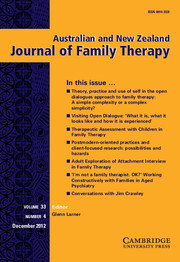This issue is testament to the increasing relevance, effectiveness and application of family therapy in the mental health field. It includes articles on a family-sensitive intervention for the community treatment of adult mental illness (e.g. psychosis), an attachment-based family therapy approach to healing intergenerational trauma in the parent-child relationship, research into the effective component of multifamily groups for treating schizophrenia, a narrative approach to working with non-custodial parents that enriches our ideas and practices of motherhood, a narrative art group intervention to address indigenous mental health for parents and children in remote Aboriginal communities and how to do qualitative research in family therapy, for eating disorders, intellectual disability, the dialogical process of therapy and systemic consultation.
Leading off is Cowling and Garrett's rousing call for a child-inclusive family approach in the community treatment of adults with mental health issues. The evidence-based treatment literature supports it, as does research demonstrating that parent(s) suffering from a mental illness have a significant impact on young persons in their care. And the numbers are compelling; in Australia alone one third of clients of mental health services are parents and over one million children live with one or two parents with a mental illness. For this reason recent government initiatives, like COPMI, encourage a child and family sensitive approach in adult psychiatric services. The authors present an integrative child-inclusive family intervention that is informed by systemic, attachment, narrative and strengths-based models. This utilises individual and family sessions to enhance the narrative voice of young persons and family members affected by parental mental illness and fosters the relationship between parents and children.
Next, the paper by Jai Friend is an intimate and informative account of how to mitigate intergenerational trauma in the parent-child attachment relationship. Grounded in attachment theory and neurobiology research it presents an integrated family therapy intervention using three therapeutic modalities: Theraplay, Family Attachment Narrative Therapy, and Dyadic Developmental Psychotherapy. These three attachment based therapies are applied to a challenging case of developmental trauma affecting a mother and her nine-year-old boy living in a family context complicated by a father suffering from a psychotic illness. The paper illustrates how to incorporate attachment focused therapies in the theory and practice of family therapy.
Continuing the theme of using family therapy to treat adult mental health issues, Frank Deane, Joanne Mercer, Anahita Talyarkhan, Gordon Lambert and Judy Pickard present an empirical study of multi-family group therapy (MFGT) for people with schizophrenia. A primary component of MFGT is the specific problem-solving skills taught in-session and their generalisation to the outside environment, by the completion of assigned homework tasks and through the extended support and cohesion of the group. While the study found no link between the level of group cohesion and homework completion, it did link the former with spontaneous between-session therapeutic activity. That is, the effective component of MFGT is not just problem-solving, but support provided by an extended family group network.
The article by Jenny Snowdon and Elmarie Kotzé draws on qualitative research and family therapy practice in New Zealand to examine the experiences of non-custodial mothers who no longer have everyday care of their children. Taking a narrative and poststructuralist perspective it discusses non-resident mothers' positions, outside taken-for-granted and familiar mothering practices. It addresses themes of financial positioning, non-residence viewed as sense of failure (‘bad mother’) and actions that recognise and resist an outside position. This challenging account of ‘mothering-on-the edge’ offers a personal, professional and political perspective of motherhood, which is illustrated by a narrative therapy application.
In their article, Caroline Stock, Sarah Mares and Gary Robinson describe a structured group intervention using storytelling and art with parents and children in a remote Aboriginal community. The Let's Start Parent-Child Program is a manualised parent-child program developed to improve educational, social and emotional outcomes for Aboriginal parents and their four- to seven-year-old children. It has been implemented in the Northern Territory, Australia on the Tiwi Islands and in Darwin since 2005. The authors adapted the program to include a narrative approach that uses drawing and painting to present stories and open up externalising practices based on familiar activities. A detailed example illustrates how the program is sensitively designed for parents, children and families in a local community and delivered in a way that takes into account cultural, developmental, interpersonal and family differences.
In an article based on a plenary speech at the 2011 Australian Family Therapy Conference, Paul Rhodes provides a bird's eye view of qualitative research in family therapy. After discussing four major themes in the recent development of the field, he challenges common myths about research and explores ways to bridge the scientist-practitioner gap. Paul describes ground-breaking qualitative research with his doctoral students in clinical psychology that crosses the boundary with family therapy. Process research, participatory action research and methods aligned to specific models of therapy are explained and illustrated, with application to eating disorders, the therapist's dialogical self, family of origin coaching and systemic consultation in disability services. This amply demonstrates Paul's thesis that family therapists have nothing to fear from research.
We look forward to the September issue on systemic therapy and trauma by guest editors, Laurie MacKinnon and Kerrie James.


